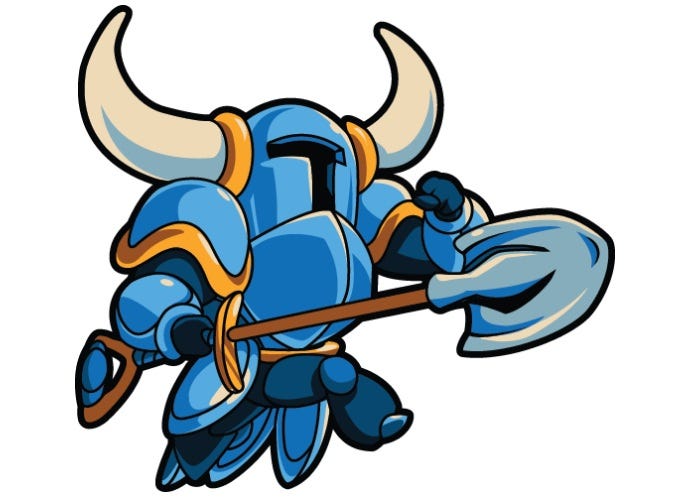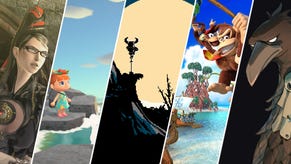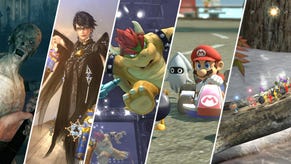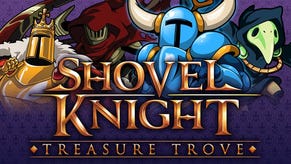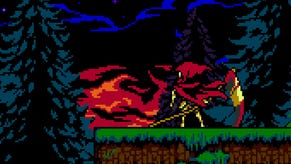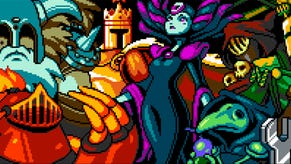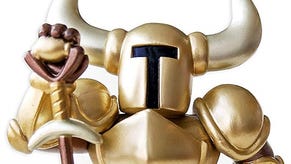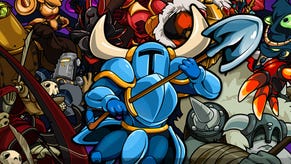Shovel Knight: retro action in spades
Is Nintendo a good place for indie developers? Dave Owen catches up with Yacht Club to discuss focused gameplay, the problem with triple-a development and the retro resurgence.
It’s all been a bit doom and gloom for Nintendo lately, so the impending arrival of several distinctly retro-styled new games for Wii U and 3DS has almost slipped under the radar. While they might not do much to silence criticisms of Nintendo failing to refresh its software library, there are others who take it as a sign that the company is quietly catching up to its rivals in embracing the indie scene. Oh, and the games look rather good, too.
"The focused gameplay of the 8-bit era is just as memorable to us as its beautiful art. The spark of the idea came from a question: could we make an entire game built upon a single mechanic?"
One of the most anticipated is Shovel Knight, an 8-bit styled platformer from new studio Yacht Club, founded by former staff of retro specialists WayForward. It’s inspired by classics such as Mega Man and Castlevania, as well as modern death-dealer Dark Souls. You play the titular knight armed with a ShovelBlade. You must use it to defeat a menagerie of foes across technicolour pixellated levels, all in the name of rescuing your one true love.
“All the members of Yacht Club grew up playing the NES, the SNES, and the N64,” says Nick Wozniak, pixel artist on Shovel Knight. “Locked deep inside our hearts is a love for vibrant colours, tiled backgrounds, shifting palettes, and focused gameplay.”
It’s this last point that is at the heart of Shovel Knight. Where most modern games lay an entire arsenal at your feet, here the gameplay is stripped back to a central technique: the downward sword thrust. “The focused gameplay of the 8-bit era is just as memorable to us as its beautiful art,” says Wozniak. “The spark of the idea came from a question: could we make an entire game built upon a single mechanic?”
To pull this off the tool at hand needed to be capable of greater variety than a simple blade. “We knew the character was going to be stabbing downwards, but maybe he could also flip his enemies over so he could expose their vulnerable undersides?” says Wozniak. “We thought, he’s probably not only going to be stabbing enemies, maybe he should also stab through blocks of dirt. The weapon we were talking about would make no sense as a sword so something was needed to fit all these elements together and someone suggested a shovel. We all laughed, and then started to take it seriously.”
The playful exterior of Shovel Knight belies a resolutely old-fashioned challenge, although Wozniak is keen to stress that the difficulty level forgoes the trial-and-error injustice of some NES games. “Shovel Knight will be difficult in that it will demand the player to use lessons they’ve learned and utilise the tools given to them with very little handholding,” he explains. “But the player will never be left wondering why they failed a certain challenge.”
The retro influence reaches to every corner of Shovel Knight. The team even recruited legendary Mega Man composer Manami Matsumae to write a couple of songs for the soundtrack.
Shovel Knight rides a wave of upcoming retro-inspired adventures, including Comcept’s spiritual Mega Man successor Mighty No.9, Lobodestroyo, and Grapple Knight. Lineage aside, these projects also share in common a successful Kickstarter campaign. Shovel Knight more than quadrupled its original goal to raise a total of $311,502. Despite the arrival of powerful next-gen consoles, there clearly remains a tremendous appetite for nostalgic experiences.
“The NES era feels very different than the current generation of games,” says Wozniak. “Big games today have enormous teams and budgets, voice actors from popular media, lifelike motion capture, cutscenes, script writers, casting agents and lighting directors etc. Take any screenshot of today’s AAA games and you’re looking at a representation of hundreds of individuals’ blood, sweat and tears. And while there’s a lot to be said for productions like that, having so many departments and interests in developing the game can dilute the core experience.
"Right now, there exists that ideal blend of accessibility and relevance which is propelling the retro game genre back into the limelight."
“Compared to the top AAA games of today, games made in the NES era of game development were all focused on the gameplay: the moment to moment choices that the player makes and the balance of risk and reward. Art was important, but visuals weren’t allowed to get in the way of the gameplay.”
This renewed interest in retro-styled games can also be attributed to the democratisation of the market that has allowed independent game development to flourish. “The feasibility of making a game is higher than it has ever been before,” says Wozniak.
“There are many resources available for all levels of experience and ultimately it comes down to the creativity of the team or individuals that wield those tools. More to the point, a retro-styled pixel game allows for quick iteration and low cost art; the perfect combination for a gameplay focused development. Right now, there exists that ideal blend of accessibility and relevance which is propelling the retro game genre back into the limelight.”
Yacht Club is under the pressure of both a dedicated, vocal fan base with high standards, and the expectation that is inherent after any successful Kickstarter campaign. Despite the stress of needing to please their backers, the team has remained conscious of not falling victim to ‘feature creep,’ a problem that sees developers exceed their time and budget restraints by trying to pack too much into the final product.
“I think the biggest [challenge] is that for the past year everyone that’s seen a trailer or demo has their own idea of what the game will be,” says Wozniak. “Some think Mega Man, others are hoping for more Castlevania, some Dark Souls, and some are even expecting a Ducktales. Meeting everyone’s expectations all at once while also producing a coherent experience has been a uniquely difficult but ultimately rewarding task.”
Although Shovel Knight is also coming to PC, Mac, and Linux, the console release is currently exclusive to Nintendo platforms. Yacht Club is unconcerned by news of the company’s financial troubles and some relatively poor software sales. “Nintendo has been really accommodating and helpful. They’ve loaned us kits and worked with us on logistical problems that have gotten in our way. Since the beginning, the dream was to have Shovel Knight on a Nintendo platform, and having them be so easy to work with is really just icing on the cake.
“That said, we are also looking to other hardware horizons and would love to have Shovel Knight on as many platforms as possible.”
The team is aiming to make the most of its Nintendo exclusivity by utilising each platform’s unique capabilities. The Wii U version will feature off-screen play and Miiverse integration that will see players using the GamePad to draw hints and pictures for other players that can be left around the levels. The 3DS version makes eccentric use of StreetPass, allowing players to record short gameplay clips of combat or gem collecting within an enclosed arena. These clips will be shared with other players and spliced together so that the recorded battles play out in real-time.
“Even on Nintendo consoles of the past that have been considered ‘failures’ there have been outstanding hits that people really love and remember. We hope Shovel Knight can find that place in players’ hearts.”
Shovel Knight will be unearthed on March 31.
